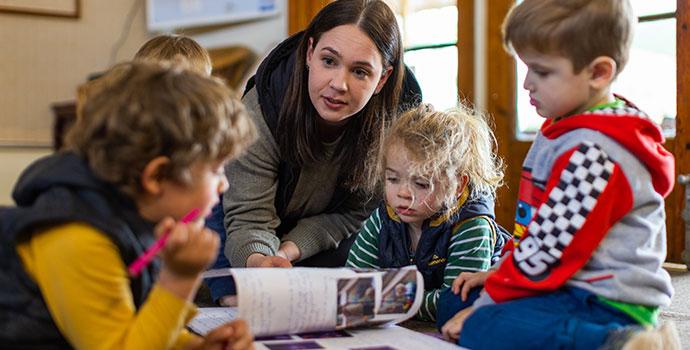
Hensman Street Elementary in Perth is looking into research on play and inquiry. ‘Our observations, videos, photographs and records tell us how our children are engaging in learning and interacting with peers, the environment and our educators,’ says Tanya Steers, Principal.
Drawing on this evidence and external evidence from research, Steers and her colleagues continue to build an understanding of how children are thinking and what influences their development.
Steers explains, ‘What we read and learn from research we see play out in our work with children. The evidence we generate as practitioners also aligns with evidence from other experts. As a result, we believe we have a greater impact on children’s learning and our practice is becoming more effective in assisting children’s holistic development.’
Research, and the evidence it provides, helps educators be more intentional in their practice and guides important policy decisions to improve children’s outcomes and life trajectories.
Over the past decade, sustained investments across Australia have increased participation in the early childhood education and care (ECEC) sector. This is good news, given the wealth of research on the importance of ECEC in supporting the learning and development of young children, particularly those facing disadvantage.
We know, however, that attending an ECEC service is not enough. Research shows that the quality of ECEC matters: quality educator-child interactions and learning activities are key drivers of gains in children’s learning and development. For example, supporting exploration through movement and play, reading and discussing stories and counting, grouping and comparing with children are all teaching strategies shown to be related to key learning and development outcomes.
Much of this is already known and implemented. In total, 87% of ECEC services are rated as meeting or surpassing in Quality Area 1 (Educational Program and Practice), up from 67% in 2013 (PDF). However, there is space for improvement to ensure all children are supported to succeed, particularly children living in disadvantaged areas where highly rated ECEC services are less common (PDF).
To help children have access to quality ECEC, The Australian Education Research Organisation (AERO) will work closely with you. AERO is Australia’s national education evidence body, generating high-quality evidence, making high-quality evidence accessible and enhancing the use of evidence in education.
We are listening to you and collaborating with you to ensure you are supported to use evidence to inform your practice. Together, we can work towards excellent and equitable outcomes for all children and young people.
AERO’s first set of Tried and Tested guides provides concise and practical advice for educators on how to best support the development of early literacy, early numeracy, and executive function and self-regulation. We plan to continue to build on these resources, in consultation with you, so you have easy access to trusted, useful guidance.
At Hensman Street Elementary, the team individually reads the research they engage with, then meets to discuss their reflections, generates shared understandings and beliefs about the evidence and determines how it can be applied to their context.
Steers says, ‘We support our educators to identify how and where evidence can be used to enhance elements of our program and practice. After making changes to our program, based on the evidence, we meet again to share and reflect on those changes.
‘We can see firsthand that children are constantly changing, so we believe it is important as educators to be current in our knowledge about child development and find innovative ways to support learning and equip children with the skills they need for a lifetime of success.’
About the authors
Zid Mancenido is the Australian Education Research Organisation’s Senior Manager of Research and Evaluation. Having started his career as a high school social sciences teacher in Canberra, Zid has experience working across education policy, practice and research with organisations around the world, including Teach for Australia, the Australian Government and the National Institute of Education (Singapore). Most recently, he taught courses in teaching quality and general pedagogy at Harvard Graduate School of Education. He is currently completing his PhD in Education Policy and Programme Evaluation at Harvard.
Amie Fabry is a Senior Researcher with AERO. She is an experienced early childhood teacher and university lecturer, and previously worked as a policy consultant for the Department of Education WA, providing advice and developing professional learning for early childhood teachers and school leaders. She is currently completing a PhD in early childhood pedagogical leadership and her research interests and expertise include early childhood pedagogy, policy and leadership.
This article was originally published in The Spoke.